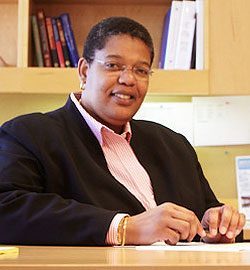January 20, 2012 — Michelle Williams, SM ’88, ScD ’91, began as Chair of the Department of Epidemiology and Stephen B. Kay Family Professor of Public Health at Harvard School of Public Health in August 2011. Previously a professor of epidemiology and global health at the University of Washington School of Public Health, Williams has a long-standing relationship with the HSPH Department of Epidemiology, from which she received her doctorate in 1991. Williams’s major research interests lie in the areas of women’s reproductive health and child health. In 2011, President Barack Obama presented Williams with the Presidential Award for Excellence in Science, Mathematics, and Engineering Mentoring.
Q: What are your goals as Epidemiology’s new chair?
A: I have been fortunate to step into what I believe is an excellent department, within an excellent school of public health, within an excellent university. I graduated from this department. It is characterized by extremely hard working, creative, innovative faculty members, and those features are even more acutely obvious in our students and postdoctoral fellows. My goal is to continue to build on those strengths by strategically expanding programs in reproductive and perinatal epidemiology. This is my own area, and also ties into the School’s flagship Women and Health Initiative. I also am excited about creating more opportunities, both global and domestic, for our doctoral students to apply epi methods in the field.
Q: Will you be teaching?
A: I will teach this year as a guest lecturer, and will work to identify areas of opportunity where I can develop either an advanced course in reproductive and perinatal epidemiology, or fill a gap that might exist. And I’m very much looking forward to mentoring doctoral students and postdoctoral fellows in the coming year.
For me, chairs [of departments] are very much part of the community of teachers. Someone once told me that entering an administrative position requires you to think about teaching as a third-person exercise. And that might be true for some. But I want to still be very much involved in the first-person moment of teaching and bringing people along. Students are freethinking, freewheeling. They’re fearless. And that helps my science. I think we all benefit from them more than we would admit.
Q: Do you consider the shrinking National Institutes of Health budget to be one of your biggest constraints right now?
A: The work that we do is increasingly more sophisticated, more complicated, and requires more collaborations and more resources. And we’re at a time where we all have to be very mindful that those resources are not going to grow with our needs. So, it’s important to keep looking for efficiencies in teaching, research, and administration. It’s going to force us to really articulate and focus on priorities. But I think in a research, discovery, and educational environment, we have to have some degree of freedom for unanticipated opportunities that arise. I’m hopeful that with the resources we have here, we’ll still be able to support good ideas.
Q: Besides teaching what are the other satisfactions of being in this job?
A: Changing the world. The fact that in public health, our mission is to discover and to translate those discoveries into ways that change the world and alleviate or prevent suffering is a pretty amazing thing. And as an academic, you’re not just changing the world by creating new knowledge. You’re creating a generation of people who will be there to carry on that legacy.
An epidemiologist can bear witness to problems that people choose not to see. We do the accounting. We do the reporting. And then we can carry that through to identifying the interventions and policies that, for example, have impacted IQ levels of kids in inner cities, or you name the issue.
Q: What do you consider to be the most important issues right now in epidemiology?
A: It is important for epidemiologists to continue to lead the charge in documenting the adverse health outcomes of Westernized diets and sedentary lifestyles, even in low-income countries. Prevention and chronic disease control is so acutely needed in a place like Addis Ababa, Ethiopia, because the tertiary level care that you might take for granted here doesn’t exist.
Health disparity is a huge issue here in the United States, but disparities in global health get your attention really quickly. I can get American students to really understand health disparities in America more acutely by taking them to a low-income country. I think sometimes we live in our small communities, and we think we know the ill effects of poverty. And then you take someone outside of what they know. You are open to seeing more things, and connections start to come together.
– Madeline Drexler, Amy Roeder
